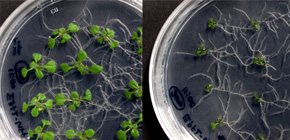
Mechanisms by which Plants Repress Growth under Osmotic Stress
Osmotic stress directly modifies well-known developmental program for epidermal development
Kumari Archana , PhD course student (currently post-doc of Osaka University), Pawan Jewaria , PhD course student (currently post-doc of Bremen University), Tatsuo Kakimoto , professor, of Osaka University, and Dominique Bergmann , professor of Stanford University, clarified the molecular mechanisms by which Arabidopsis plants repress their growth when they face high osmolality, which can mimic drought. Plants, which are sessile unlike most animals, greatly change their sizes depending on their environment. The growth reduction exhibited by plants under stress is considered to be part of their survival strategy, but the molecular mechanisms behind this osmotic-stress induced growth reduction is not well known. The group reports that osmotic stress directly modifies the well-known developmental program for epidermal development. This study was published at December issue of Plant Cell Physiology (published online on Nov 6th).
Epidermal growth under normal conditions
Meristemoid mother cells (MMCs) are stem cells in developing leaf epidermis. MMC number is auto-regulated by a negative feedback loop, consisting of the secretory signaling molecule EPF2, MAP kinase cascade, and SPEECHLESS. SPEECHLESS is necessary for the maintenance of stem cell identity. Because EPF2 is produced in MMC and activate MAP kinase cascade, which phosphorylate and destabilize the SPEECHLESS protein, this signaling loop controls the number of stem cells and thus the total number of epidermal cells under normal conditions.
Integration of signals regulating basal development and signals initiated by osmotic stress
Here the research group reports that plants modulate the signaling loop by activating the MAP kinase cascade under osmotic stress. This results in decrease in the number of stem cells, and therefore decrease in total epidermal cell number.
Abstract
Plants, which are sessile unlike most animals, have evolved a system to reduce growth under stress; however, the molecular mechanisms of this stress response are not well known. During programmed development, a fraction of the leaf epidermal precursor cells become meristemoid mother cells (MMCs), which are stem cells that produce both stomatal guard cells and epidermal pavement cells. Here we report that Arabidopsis plants, in response to osmotic stress, post-transcriptionally decrease the protein level of SPEECHLESS, the transcription factor promoting MMC identity, through the action of a mitogen-activated protein kinase (MAPK) cascade. The growth reduction under osmotic stress was lessened by inhibition of the MAPK cascade or by a mutation that disrupted the MAPK target amino acids in SPEECHLESS, indicating that Arabidopsis reduces growth under stress by integrating the osmotic stress signal into the MAPK–SPEECHLESS core developmental pathway.
To learn more about this research, please view the full research report entitled " Arabidopsis Reduces Growth Under Osmotic Stress by Decreasing SPEECHLESS Protein " at this page of the Plant Cell Physiology website.
Related Link
